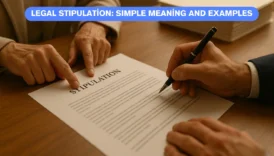What Is Hearsay Evidence?

Introduction
Hearsay evidence is one of the most debated topics in law, especially in courtroom trials. It refers to statements made outside of the courtroom that are offered in court to prove the truth of the matter asserted. Since the speaker is not present to be cross-examined, hearsay is generally inadmissible in court, though there are many exceptions.
Simple Definition
Hearsay evidence is an out-of-court statement presented in court to prove the truth of what it says. Because the original speaker is not available for questioning, hearsay is often excluded as unreliable. However, if the statement is offered for a purpose other than proving the truth, or it falls under a recognized exception, it may be admissible.
Real-Life Examples
- Witness testimony: A witness says, “My friend told me he saw the defendant at the crime scene.” (This is hearsay.)
- Police reports: A police officer testifies about what a victim told them, rather than the victim testifying directly.
- Business records: Statements made in records may be considered hearsay unless an exception applies.
- Exceptions: Dying declarations, excited utterances, or statements made during medical treatment may be allowed.
Importance of the Term
- Protects fairness: Prevents unreliable secondhand statements from influencing trials.
- Encourages direct evidence: Ensures witnesses testify in court where they can be questioned.
- Limits confusion: Avoids introducing statements that cannot be tested for truthfulness.
- Provides flexibility: Recognized exceptions allow reliable out-of-court statements when necessary.
Comparison (Hearsay vs. Direct Evidence)
| Factor | Hearsay Evidence | Direct Evidence |
|---|---|---|
| Source | Out-of-court statement | Witness testimony or firsthand account |
| Reliability | Generally less reliable | Considered stronger evidence |
| Admissibility | Usually excluded, unless exception applies | Usually admissible |
FAQ
1) Why is hearsay usually inadmissible?
Because the original speaker cannot be cross-examined in court, making the statement less reliable.
2) What are common exceptions to hearsay rules?
Business records, dying declarations, excited utterances, and statements made for medical diagnosis.
3) Is all secondhand information hearsay?
Not always. If the statement is not offered to prove the truth of the matter, it may not count as hearsay.
4) Can hearsay ever win a case?
Yes, if admitted under an exception, hearsay can be persuasive evidence.
5) Do all countries treat hearsay the same way?
No. Rules vary, but most legal systems restrict hearsay due to concerns about reliability.
Closing
Hearsay evidence highlights the balance courts must strike between fairness and practicality. While generally excluded for reliability reasons, recognized exceptions allow certain out-of-court statements to play an important role in trials.






